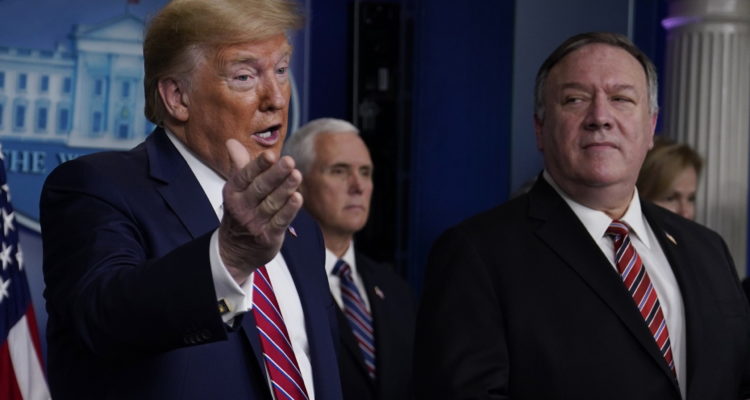Trump said that when the United States entered the deal, it was clear that the U.S. always would have the right to invoke a re-imposition of the U.N. sanctions.
By Associated Press
The Trump administration is set to demand the restoration of all international sanctions on Iran in a move that will test the credibility of the U.N. Security Council and possibly deal a fatal blow to what former President Barack Obama has pointed to as his signature foreign policy achievement, though one wrapped in controversy since its inception.
At President Donald Trump’s direction, Secretary of State Mike Pompeo will travel to New York on Thursday to notify the world body that the U.S. is invoking the “snapback” mechanism in the Security Council resolution that endorsed the 2015 Iran nuclear deal.
“The United States intends to restore virtually all of the previously suspended United Nations sanctions on Iran,” Trump said on Wednesday. “It’s a snapback.”
As set out by the resolution enshrining the 2015 deal, snapback would re-impose UN sanctions that were eased in exchange for curbs on Iran’s nuclear program. But the U.S. move faces steep opposition and could prompt a revolt from the council’s other members. None of them believes the U.S. has the standing to do it because Trump withdrew from the nuclear deal two years ago.
Thus, invoking snapback will set the stage for a contentious dispute at the world body with the U.S. insisting it has done something that no one else recognizes as valid. It’s possible the U.S. call will simply be ignored by other UN members — an outcome that could call into question the Security Council’s relevance and ability to enforce its own legally binding decisions.
But Trump and Pompeo have made no secret of their intention to pursue the diplomatic move particularly in the wake of the administration’s embarrassing defeat last week at the Security Council on extending the arms embargo on Iran that expires in October. The U.S. won just one other “yes” vote, with China and Russia opposed and the 11 other members abstaining.
As with the arms embargo, Russia and China bitterly oppose reimposing other UN sanctions on Iran. So do other Security Council members, including U.S. allies Britain and France, which are hoping to preserve the nuclear deal in the event Trump loses his bid for a second term in November’s presidential election and his Democratic opponent Joe Biden rejoins the agreement.
The Europeans fear that the re-imposition of sanctions may prompt Iran to quit the nuclear deal entirely and plow ahead with efforts to develop atomic weapons. The Trump administration says it quit the deal precisely because it eased sanctions, opening major revenue streams for Iran while gradually easing restrictions on its nuclear activities that money could pay for.
Trump said that when the United States entered the deal, it was clear that the U.S. always would have the right to invoke a re-imposition of the U.N. sanctions. He also predicted that if he wins reelection, Iran will come begging to his administration to make a new deal.
That’s not how other countries see it.
China has said that since the U.S. is no longer a party to the nuclear deal it “has no right to demand the Security Council to activate the rapid reinstatement of sanctions.” Russia has accused the administration of unleashing a politically motivated campaign against Iran that runs counter to international law.
The Europeans have also rejected the U.S. position, which holds that the U.N. sanctions will be automatically restored 30 days after snapback has been invoked. That’s because the U.S. would veto any resolution that attempts to prolong the sanctions relief during that period.
The administration’s view is that once those 30 days have passed, any country that doesn’t enforce the U.N. sanctions will be hit with U.S. penalties for violating a binding U.N. Security Council action.
“This will be a fully valid enforceable Security Council resolution and we have every expectation that it will be enforced just like every other Security Council resolution that is in place,” Pompeo said Wednesday. ”We will be in full compliance with that and we have every expectation that every country in the world will live up to its obligations.”
What the administration’s position does not account for, however, is a scenario in which the rest of the world simply ignores the United States on the grounds that it no longer has legal standing to invoke snapback.
There is also the theory that America’s sanctions architecture won’t be able to effectively handle such a massive enforcement exercise on its own and other countries may hedge their bets pending the outcome of the Nov. 3 U.S. presidential election. Biden has said he would try to revive the agreement.
The U.S. argument is highly controversial. Not only has it been ridiculed by the Chinese, Russians and Europeans, not even the biggest Iran hawks in the United States all agree with it.
Former Trump national security adviser John Bolton, who has long held anti-Iran positions, has called the argument “too cute by half” and said the U.S. lost its snapback standing when it withdrew from the deal. He said moving ahead is not worth the damage it could do to veto power in the council.
In a rare moment of agreement, Iran’s Foreign Minister Mohammed Javad Zarif praised Bolton this week. “At least he is consistent — a trait notably absent in this U.S. administration,” Zarif tweeted.
Former U.S. Undersecretary of State for Political Affairs Wendy Sherman, a lead negotiator of the nuclear deal during the Obama administration, said, “It was never expected that someone who withdrew from the (deal) would have standing to in fact bring the snapback provision.”





